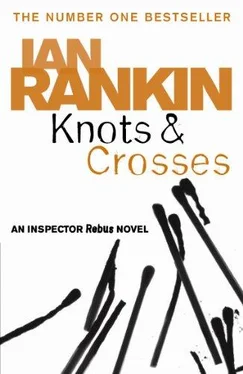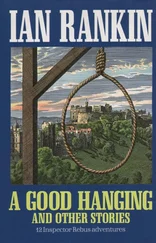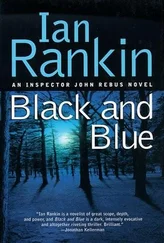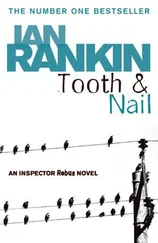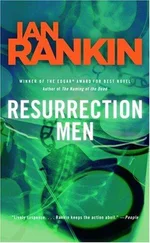‘I’m going across to my table to eat this, okay, Jimmy?’
Stevens could not believe his good luck.
‘Oh, fine, Big Man, fine.’
‘Cheers, then.’
And with that he was left alone, only the ghost of a smell remaining. He noticed that the barman was standing opposite him. His hand, shiny with grease, was held out.
‘Two pounds sixty,’ he said.
Stevens sighed. Put that one down to experience, he thought to himself as he paid, or to the hangover. The party had been worth it, however, for he had met John Rebus. And Rebus was friendly with Gill Templer. It was all becoming just a little confusing. But interesting too. Rebus was certainly interesting, though physically he did not resemble his brother in the slightest. The man had looked honest enough, but how did you tell a bent copper from the outside? It was the inside that was rotten. So, Rebus was seeing Gill Templer. He remembered the night they had spent together, and shuddered. That, surely, had been his nadir.
He lit a cigarette, his second of the day. His head was still clotted, but his stomach felt a little more composed. He might even be getting hungry. Rebus looked a tough nut, but not as tough as he would have been ten years ago. At this moment he was probably in bed with Gill Templer. The bastard. The lucky bastard. His stomach turned a tiny somersault of chilled jealousy. The cigarette felt good. It poured life and strength back into him, or seemed to. Yet he knew that it was scooping him out, too, tearing his guts to shreds of darkened meat. The hell with it. He smoked because without cigarettes he couldn’t think. And he was thinking now.
‘Hey, give me a double here will you?’
The barman came over.
‘Orange juice again?’
Stevens looked at him disbelievingly.
‘Don’t be daft,’ he said — ‘whisky, Grouse if that’s what’s in the Grouse bottle.’
‘We don’t play those sorts of game here.’
‘I’m glad to hear it.’
He drank the whisky and felt better. Then he began to feel worse again. He went to the toilet, but the smell in there made him feel even worse. He held himself over the sink and brought up a few bubbles of liquid, retching loudly but emptily. He had to get off the booze. He had to get off the ciggies. They were killing him, yet they were the only things keeping him alive.
He walked over to Big Podeen’s table, sweating, feeling older than his years.
‘That was a good breakfast, that was,’ said the hulk of a man, his eyes gleaming like a child’s.
Stevens sat down beside him.
‘What’s the word on bent coppers?’ he asked.
‘Hello, daddy.’
She was eleven, but looked and spoke and smiled older: eleven going on twenty-one. That was what living with Rhona had done to his daughter. He pecked her cheek, thinking back to Gill’s leavetaking. There was perfume around her, and a hint of make-up on her eyes.
He could kill Rhona.
‘Hello, Sammy,’ he said.
‘Mummy says that I’m to be called Samantha now that I’m growing up so quickly, but I suppose it’s all right for you to call me Sammy.’
‘Oh, well, mummy knows best, Samantha.’
He cast a look towards the retreating figure of his wife, her body pressed, pushed and prodded into a shape attainable only with the aid of some super-strong girdle. She was not, he was relieved to find, wearing as well as their occasional telephone conversations would have had him believe. She stepped into her car now, never looking back. It was a small and expensive model, but had a sizeable dent in one side. Rebus blessed that dent.
He recalled that, making love, he had gloried in her body, in the soft flesh — the padding, as she had called it — of her thighs and her back. Today she had looked at him with cold eyes, filled with a cloud of unknowing, and had seen in his eyes the gleam of sexual satisfaction. Then she had turned on her heels. So it was true: she could still see into his heart. Ah, but she had failed to see into his soul. She had missed that most vital organ completely.
‘What do you want to do then?’
They were standing at the entrance to Princes Street Gardens, adjacent to the tourist haunts of Edinburgh. A few people wandered past the closed shops of a Princes Street Sunday, while others sat on benches in the gardens, feeding crumbs to the pigeons and the Canadian squirrels or else reading the heavy-printed Sunday papers. The Castle reared above them, its flag flying briskly in the all-too-typical breeze. The Gothic missile of the Scott Monument pointed religious believers in the right direction, but few of the tourists who snapped it with their expensive Japanese cameras seemed at all interested in the structure’s symbolic connotations, never mind its reality, just so long as they had some snaps of it to show off to their friends back home. These tourists spent so much time photographing things that they never actually saw anything, unlike the young people milling around, who were too busy enjoying life to be bothered capturing false impressions of it.
‘What do you want to do then?’
The tourist side of his capital city. They were never interested in the housing-estates around this central husk. They never ventured into Pilton or Niddrie or Oxgangs to make an arrest in a piss-drenched tenement; they were not moved by Leith’s pushers and junkies, the deft-handed corruption of the city gents, the petty thefts of a society pushed so far into materialism that stealing was the only answer to what they thought of as their needs. And they were almost certainly unaware (they were not, after all, here to read local newspapers and watch local TV) of Edinburgh’s newest media star, the child murderer the police could not catch, the murderer who was leading the forces of law and order a merry dance without a clue or a lead or a cat in hell’s chance of finding him until he slipped up. He pitied Gill her job. He pitied himself. He pitied the city, right down to its crooks and bandits; its whores and gamblers, its perpetual losers and winners.
‘So what do you want to do?’
His daughter shrugged her shoulders.
‘I don’t know. Walk maybe? Go for a pizza? See a film?’
They walked.
John Rebus had met Rhona Phillips just after joining the police. He had suffered a nervous breakdown just prior to his joining the force ( why did you leave the Army, John ?) and had recuperated in a fishing-village on the Fife coast, though he had never told Michael of his presence in Fife during that time.
On his first holiday from police-work, his first proper holiday in years, the others having been spent on courses or working towards examinations, Rebus had returned to that fishing-village, and there had met Rhona. She was a schoolteacher, already with a brutally short and unhappy marriage behind her. In John Rebus she saw a strong and able husband, someone who would not flinch in a fight; someone she could care for, too, however, since his strength failed to conceal an inner fragility. She saw that he was haunted still by his years in the Army, and especially by his time in ‘special services’. He would awake crying some nights, and sometimes would weep as he made love, weeping silently, the tears falling hard and slow on her breasts. He would not speak about it much, and she had never pushed him. She was aware that he had lost a friend during his training days. She understood that much, and he appealed to the child in her and to the mother. He seemed perfect. Too, too perfect.
He was not. He should never have married. They lived happily enough, she teaching English in Edinburgh until Samantha was born. Then, however, niggling fights and power-plays had turned into sourer, unabated periods of resentment and suspicion. Was she seeing another man, a teacher at her school? Was he seeing another woman when he claimed to be involved in his numerous double-shifts? Was she taking drugs without his knowledge? Was he taking bribes without hers? In fact, the answer to all of these suspicions was no, but that did not seem to be what was at stake in any case. Rather, something larger was looming, yet neither could perceive the inevitability of it until too late, and they would cuddle up and make things right between them over and over again, as though in some morality-tale or soap-opera. There was, they agreed, the child to think of.
Читать дальше
